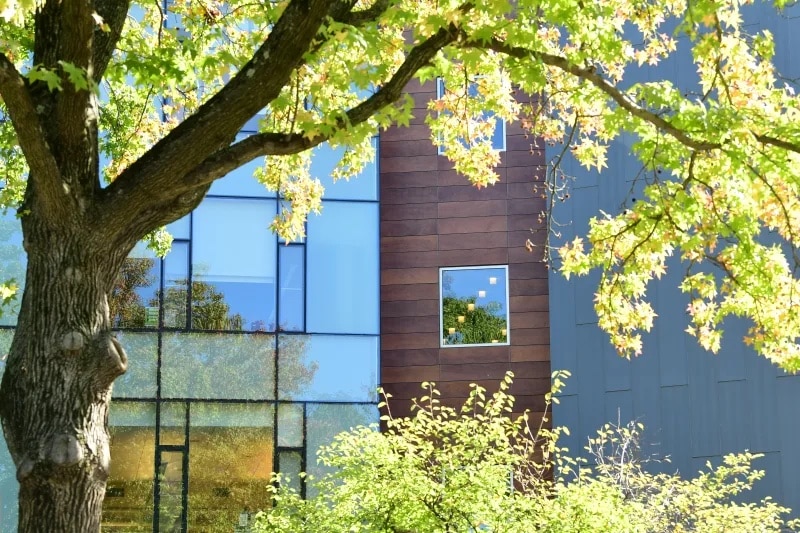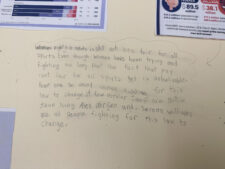In January, the All School Multicultural Committee (ASMC) and the Alumni Office hosted their second alumni speaker series event of the year, Philanthropy: Bridging Economic and Racial Injustice. ASMC Co-Chair and moderator Hayden Greene introduced the panel by emphasizing the value of the series, saying that “the more we tell these stories, the more we find commonality and we find things that we can learn from each other. Our alumni have so much to bring to the table and this series is our pride and joy.”
Fieldston alumni Manuela Arciniegas ’97, Adam Gaynor ’92, Charles Imohiosen ’93, and Leya Petrovani Miller ’10 shared from their experiences working in philanthropy, at foundations, and throughout the nonprofit sector. Here are four takeaways from the panel.
The awareness of philanthropy often originates at home.
For Arciniegas, it all started when she was a child “learning how to share and how important it was.” She credits learning about the interconnectedness of communities, the importance of kindness, and the responsibility we have to one another for fostering her lifelong commitment to supporting the causes she believes in. Imohiosen grew up in a family that had a strong commitment to social justice, so having concerns about social justice and social equity came naturally to him. Hearing her mother talking about providing support to a friend who needed it was just one way that Petrovani Miller saw her family’s generations-long commitment to philanthropy in action.
Fieldston’s ethical education motivates many graduates to work in social justice and philanthropy.
From the first day that students arrive at the Ethical Culture Fieldston School, ethics is imbued into their everyday life. Whether a student attends ECFS for 14 years or one year, the emphasis on how to move through the world ethically stays with students well past graduation. Gaynor spoke of how Fieldston’s commitment to service learning helped to crystallize the values that he had already learned through conversations about social justice at home.
But it was an interdisciplinary course taught by Bob Montera, Fieldston Upper English and History Teacher, and Joe Algrant, Incoming Head of School, that helped shape his future work. “We explored the impact of pollutants on the environment of low income communities, and that really got me interested in public policy and environmental justice,” he said.
Financial support is just one way to fight for causes that you believe in.
The first step to getting involved in philanthropy is to find something you’re passionate about. For Gaynor, it was seeing tenants being evicted and losing their homes. He had to ask himself, “What’s the next step? Is it about giving to an organization, is it doing research, is it forming a coalition with other buildings? Am I going to engage my elected officials?” Whether you have $100 or $1 million to give, Gaynor says that the size of the gift doesn’t matter once you’ve identified something you feel strongly about, and as long as you’re engaged.
In fact, philanthropy isn’t only about financial giving. As Petrovani Miller puts it, “Anybody can be a philanthropist. We can all be givers.” Sharing time and resources can be just as valuable to organizations, causes, and individuals as a monetary gift.
Philanthropy is accessible to everyone.
The panelists explained that they see philanthropy as any act that supports communities, and they emphasized that it’s something that everyone is able to do. Greene described philanthropy as a big word and a bigger concept, but fundamentally it’s the things “that we’re doing when we try to be a good person and try to be better about being a world citizen.”
Petrovani Miller agreed, pushing back on the idea that philanthropy is something that’s only accessible to the very wealthy, when data shows that minority communities are some of the most philanthropic groups. When looking ahead to the future of philanthropy, Petrovani Miller believes that it won’t just be the billion-dollar foundations who will support social change. Instead, she says it’s up to all of us to “commit ourselves to not just giving money, but to giving holistically and committing ourselves to mindset and attitude shifts as well.”
Those mindset shifts help make clear the unique power that you have to offer to a cause you believe in, says Arciniegas. Once you’ve committed to making a difference, you can ask yourself, “What would it look like if we were to use that power to go where the hurt is?”
Read more about the alumni panelists here.



